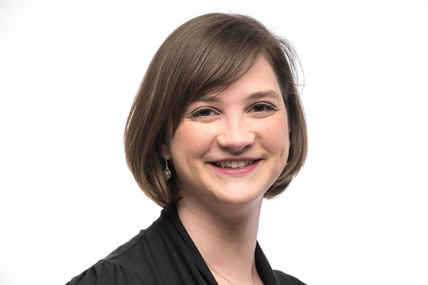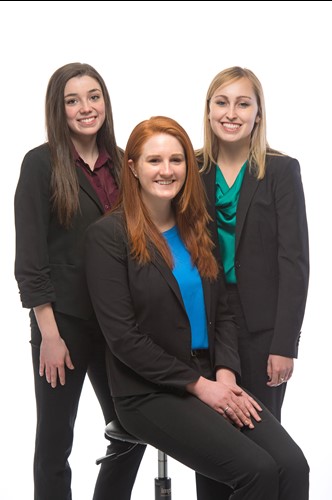College News
Spring 2015
#savvywomen

Leila Whitley (MBA ’16) developed a social media platform out of a concern that many young women are overlooking business schools as a path to achieving their larger career goals. #savvywomen, launched Feb. 18, is intended to encourage women to consider an MBA or other graduate business program. The website savvywomenmbas.com and the related Twitter hashtag reached more than 300,000 women in its first 10 days.
“We need more women in MBA programs,” Whitley says, citing the fact that women make up the majority of overall undergraduate students, but only a third of graduate business students. “The MBA is such a flexible degree and valuable for so many women with many types of experience. Women need to know about this option.”
The website offers resources provided by the Forté Foundation, a consortium of companies and business schools that encourages women to pursue MBAs. Along with the Mendoza College, colleges and universities including Harvard Business School, Stanford Graduate Business School and the Kellogg School of Management at Northwestern University also are participating in the project.
Launch of a New Institute
This spring, the University and Mendoza College launched a new institute that will greatly advance investment-management research and educational outreach on a global scale. The Notre Dame Institute for Global Investing will leverage three key strengths — the top-rated finance faculty, the innovative finance curriculum and extensive strategic partnerships — to form a platform for both learning and influencing the way investment managers the world over think about global finance.
The Institute’s goals include expanding internship and career placement opportunities; leveraging key partnerships among the College, the Notre Dame Investment Office and ND’s extensive alumni network; furthering faculty research and thought leadership, especially related to ethics; attracting prospective finance faculty; and adding depth and breadth to Mendoza’s already strong finance curriculum.
Associate Finance Professor Shane Corwin has been named as the Institute’s director. Corwin, who joined Notre Dame in 2000, teaches and researches in the areas of security market design and investment banking. He has published articles in numerous finance journals, including the Journal of Finance, the Journal of Financial Markets, the Journal of Financial Intermediation, and Financial Management. In recent articles, he studied the role of limited attention in securities trading, the measurement of transaction costs and conflicts of interest related to maker-taker fees on U.S. stock exchanges.
Corwin has served as a member of the Nasdaq Economic Advisory Board and has been awarded research grants from the Notre Dame Deloitte Center for Ethical Leadership, Morgan Stanley and the Q-Group. He received a B.S. and an MBA from Mankato State University, and a Ph.D. in Finance from The Ohio State University.
“The Notre Dame Institute for Global Investing provides that vital nexus for research, the classroom, our alumni and other partners so that we can leverage all of it for a greater impact than the sum of its parts,” said Mendoza Dean Roger D. Huang. “I’m confident that under Shane’s experienced leadership, we will be able to expand opportunities for our stakeholders and become a significant voice for ethical business in the area of global investment.”
The Art of Fundraising
Nearly 200 leaders from area nonprofits attended “Fundraising for Nonprofits,” a half-day conference in January organized by Mendoza’s Nonprofit Executive Program (NEP) and the Notre Dame Office of Public Affairs. Lou Nanni, vice president of Notre Dame University Relations, served as featured speaker, discussing lessons he learned from his experience in fundraising for both the Center for the Homeless in South Bend, Indiana, and for the University.
The event was the third in a series of annual breakfasts offered to area nonprofit leaders. Previous conferences addressed topics also of critical interest to community organizations, such as how to be an effective nonprofit board member and effective communication. Attendees included leaders from a range of arts and human-service organizations, including the American Cancer Society, Hannah’s House and the Jewish Federation of St. Joseph County.
“The breakfast series for nonprofits has been a great success,” said Marc Hardy, NEP director. “The goal for the 2015 program has been to give those attending nuggets of information they could immediately use in their fundraising efforts.” Participants learned that first, fund development is a long-term process and a successful effort is created over years, not months; and second, all fund development begins with establishing a connection between the donor and the organization’s mission. Building relation- ships based on shared interest is key to building a fund development plan.
Rankings

Rankings Change-up
Since 2006, Bloomberg Businessweek has published an annual ranking of the top undergraduate business programs in the nation. And for the last five years — 2010-2014 — Mendoza College of Business has claimed the No. 1 spot.
However, Businessweek put the ranking on hold for 2015 while the business publication reconsidered its methodology. When it resumes in 2016, the survey will focus on “the aspect of business programs that sets them apart from other undergraduate programs: career preparation,” according to the publication’s business school staff. This means that the methodology will no longer include a measure of academic quality. The components are as follows: employer survey, 40 percent; student survey, 35 percent; Class of 2015 starting compensation, 15 percent; and the proportion of Class of 2015 with internships, 10 percent.
Businessweek also made changes to its rankings of graduate programs. Most notably, full-time MBA rankings will be published on an annual basis in the fall instead of biennially. The new methodology also omits intellectual capital as a measure, but introduces an alumni survey. The elements include: employer survey, 35 percent; alumni survey, 30 percent; student survey, 15 percent; Class of 2014 placement rate three months from graduation, 10 percent; and starting compensation for combined classes of 2012-14, 10 percent.
Silver and Gold
The Mendoza College picked up three honors for its marketing efforts from the 30th Annual Educational Advertising Awards, which are sponsored by Higher Education Marketing Report. Mendoza’s outdoor ad campaign in Chicago’s Millennial Station won a gold and a Best in Show award. The College’s newly redesigned website received a silver award.
The Educational Advertising Awards is the largest competition focused on educational advertising in the country. This year, 2,000-plus entries were received from more than a thousand colleges, universities and secondary schools nationwide as well as several foreign countries.
Many Paths
The theme of the Seventh Annual Undergraduate Women in Business (UWIB) Professional Development Conference, held at Mendoza Feb. 13-14, was “Finding a Career Path You Love.” Business and non-business students gathered to hear about the many career paths available to women from speakers Kristin Boyd, a vice president in equity derivative sales at Credit Suisse, and Laura Hollis, an associate professional specialist of accountancy at Mendoza. The conference, co-chaired by students Patricia Bartlett (ACCT ’16) and Whitney Spiegel (FIN ’17), also included a panel discussion and speed-networking session.
“The sense I get from this conference, as well as a lot of other conversations I have had with college-age women, is that they feel enormous pressure to do every- thing, and to make everyone happy. They have a hard time knowing the difference between what’s expected of them, and what will make them happy,” said Hollis.
“Most of my advice was about finding balance, which in my opinion, means seeing your career as part of your life, not your whole life, as well as thinking about the entire length of your life. In other words, you shouldn't be thinking that everything has to be ‘done’ by the time you are 30 or 40,” Hollis added.
The publication plans to discontinue its biennial ranking of Executive MBA and Executive Education programs altogether.
Blue Equals Green
BlueBucket started as a classroom project, but the social venture already has launched in the South Bend area with some success. And the three business undergraduates behind it have their sights set on putting “blue buckets” across the U.S. as a way of boosting charitable donations and building community spirit.
Founded by seniors Mary Cornfield, Alisha Anderson and Caitlin Crommett, BlueBucket partners with local restaurants to collect donations for area charities. The concept is straightforward: Restaurants designate certain menu items as “BlueBucket” and agree to donate part of the price to charity. The customer chooses the charity from a list to receive the donation, which is forwarded on a monthly basis. The students currently have five eateries on board, as well as five charities. Visit the website bluebucketsb.weebly.com for more information.
“It’s nice to see something we’ve been doing in class actually make it into the community,” Cornfield said. “It’s nice knowing that the products we bring into market are helping charities raise money.”
Student Power Unleashed
Unleashed, a student-led organization devoted to promoting impact investing, is rapidly gaining members and interest, according to co-founder Thomas Flaim (FIN ’16).
Its membership has grown to more than 80 student members in just two years. “Unleashed is more or less becoming an impact investing center as I see it,” he said. “We hope to ultimately have the group replaced with an actual impact investing center at Notre Dame.”
The group’s ambitious plans include the following components:
-
Social Venture Capital (SVC) funds, where student teams will work on independent projects involving existing impact investing funds.
-
Social enterprise consulting, where student teams will be assigned to an actual early-stage social enterprise for the semester in which they offer suggestions and work directly with the entrepreneur.
-
Social Impact Bond (SIB) Lab, which offers a new approach to government financing of social service programs. Unleashed’s first project involves working with Reading for Life, a program to help nonviolent first-time offenders avoid future infractions.
Rare Honor
A research paper about unfairness in baseball signing bonuses by Mendoza College senior Jonathan Gordon has been accepted for publication in an academic journal. The paper, “Foul Ball: Major League Baseball’s CBA [collective-bargaining agreement] Exploits College Seniors in the MLB Draft,” is forthcoming in the University of Texas Entertainment and Sports Law Review.
The paper examines the Major League Baseball (MLB) draft process and how college seniors routinely receive signing bonuses well below the amount recommended by the league. Forbes already has cited the study in a story published just prior to the 2014 draft, and Gordon received special recognition at the Academy of Legal Studies in Business annual meeting in August.
Accountancy Teaching Professor Tonia Murphy, who teaches business law, advised Gordon on his paper and said it is rare for an undergraduate student to be published in an academic journal. “It is especially impressive that Jonathan had the initiative to undertake this research project not as part of any course or for academic credit, but purely out of his active interest in the topic,” she said. “It is a great paper.”
Global Ethics
Notre Dame Ethics Week 2015 focused on “Ethics Through a Global Lens” during a series of talks Feb. 9–12. The annual series, which brings in experts from a diverse array of industries to explore current ethics issues, featured keynote speaker Joan Dubinsky, chief ethics officer of the United Nations Ethics Office. Dubinsky is an expert in the field of organizational ethics and compliance in the private and nonprofit sectors, as well as with international institutions.
Other talks in the series addressed areas as diverse as international pricing and tax practices, the University’s global mission and faculty perspectives on key challenges in several regions of the world. Speakers included Jerry Carter, vice president, Tax and International Finance, IDEX Corporation; Tom Guinan, associate vice president for Administrative Operations, Notre Dame International; and a Mendoza faculty panel featuring Marketing Professor Georges Enderle, Marketing Professor Patrick Murphy and Associate Management Professor Oliver Williams, CSC.
Ten Years Hence

The 2015 Ten Years Hence lecture series highlighted the topic of impact investing, an emerging field that combines the ideals and practices of social enterprise, investment and charity in order to drive real and sustainable societal change. The annual spring series included speakers from diverse backgrounds and industries, from private investment to careers to global partnerships.
Sister Helen Alford, dean of the faculty of Social Sciences at the Pontifical University of Saint Thomas Aquinas, talked about how impact investing relates to Catholic Social Tradition. “Impact investing can challenge the Church to think about the potentially crucial role of profit-making business, and hence of private investment, in confronting poverty,” she said. “I’m not sure that the Christian tradition has really taken that seriously enough.” Other speakers included Michael J. Schierl, founder of Immaculata Law and Julius Capital; Mark Albion, co-founder and managing partner, More Than Money Careers, LLC; Tara Kenney, managing director, Deutsche Asset and Wealth Management, Inc.; Mirza Jahani, CEO, Aga Khan Foundation U.S.A.; Jozef Henriquez, chief of the syndications unit of the Inter-American Development Bank; and Anthony Jowid, the chief operating officer and a principal of Allied Argenta.
Up to the Challenge
Enlightened Diagnosis (EnDx), a company represented by a team of University of Notre Dame graduate students, earned second place in the 2015 Brown Forman Cardinal Challenge at the University of Louisville. The competition included 12 teams as finalists from university entrepreneurship programs around the world.
EnDx presented a business plan for a new device called Reveal3DTM that better analyzes and images breast cancer tumor biopsies than traditional methods. The device was developed by Notre Dame researchers Siyuan Zhang, the Nancy Dee Assistant Professor of Cancer Research, Jeremiah Zartman, assistant professor of chemical and biomolecular engineering, and David Hoelzle, assistant professor of aerospace and mechanical engineering. The student team charged with creating the business plan included Chief Technology Officer Scott Manwaring (MBA ’15) and Chief Financial Officer Colin O’Toole (MSA ’15), as well as graduate students from biological sciences, law and entrepreneurship.
Smart Woman Securities

Smart Woman Securities (SWS) is a new student organization that provides Notre Dame undergraduate women with a strong foundation in finance and investment strategy. The aim is to help them better control their financial futures, said Eliza Moore (FIN ’15), CEO of the SWS Notre Dame chapter. “We want to make sure that women have the skills and knowledge necessary to feel comfortable managing their own money,” said Moore. “We also want to educate them more about opportunities in the financial industry and the business world and connect more women at Notre Dame.”
Suzanne Fitzpatrick (FIN ’15) serves as SWS co-chief investment officer. Associate Management Professor Katherine Spiess is the group’s faculty adviser.
Started in 2007 by two Harvard graduates, the national nonprofit provides students with the opportunity to learn first-hand about financial markets and money management through mentoring and seminars. They also hear from successful investors, including Warren Buffett, who signed on as SWS’s sponsor. Moore and Fitzpatrick, along with SWS member Madeline McCormick (FIN ’17) traveled to Nebraska in March to meet the Oracle of Omaha himself. (Read Moore’s account of the visit here.)
McCormick became interested in the group after completing a summer internship and realizing she needed advice as to how to begin an investment strategy for her earnings. She’s far from alone. SWS cites an Oppenheimer Funds report that says 76 percent of women wish that they had learned more about money and investing growing up. Further, a Prudential Financial study found that 90 percent of all women will be the sole financial decision maker for their households at some point in their lives.

Comments